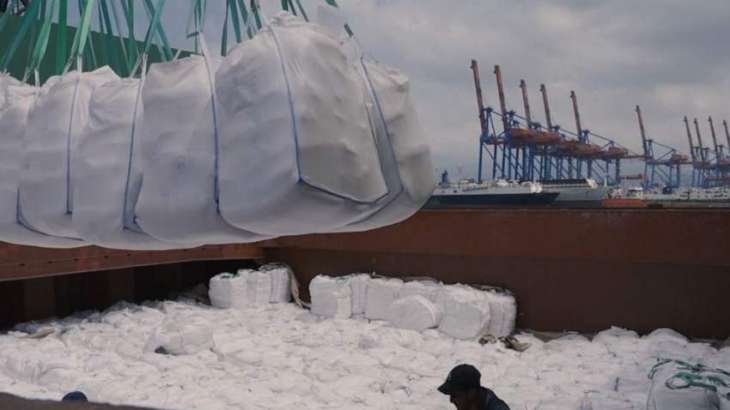More than 10,000 tonnes of flour, which were sent by Iraq to Lebanon as humanitarian aid following the deadly blast in the port of Beirut, are being kept undistributed and moldy due to negligence and improper storage in a warehouse, Maan Khalil, the head of the Ghobeiry municipality of Beirut, told Sputnik
BEIRUT (Pakistan Point News / Sputnik - 06th November, 2020) More than 10,000 tonnes of flour, which were sent by Iraq to Lebanon as humanitarian aid following the deadly blast in the port of Beirut, are being kept undistributed and moldy due to negligence and improper storage in a warehouse, Maan Khalil, the head of the Ghobeiry municipality of Beirut, told Sputnik.
Earlier, photos with sacks of flour with the inscription: "From Iraq to the brotherly nation of Lebanon" kept under the bleachers of the Beirut main football stadium and its back rooms emerged in Lebanese social networks. The photos show mold on the packages and a room with sacks flooded with rainwater. The reports caused strong outrage among the Lebanese citizens and prompted the Ghobeiry police to locate the storage.
"The economy minister himself stated on the day of the aid receipt that he had obtained the assistance and stored it temporarily for onward transmission to those people in need. We decided to check the storage condition ahead of the rainy season. The aid was placed under the stands and in back rooms. We were surprised that all of the assistance is still there and it has been exposed to moisture and started to deteriorate. The flour was not protected from water and outside influence. The economy ministry said that he received 10,000 tonnes,[but] media reported 24,000," Khalil said.
According to Khalil, as of Thursday the Ministry of Economy still have not allowed specialists and the municipal representatives to conduct a thorough review of products in an effort to save the sacks that were not affected and transport them to specially equipped storage units for further distribution to the population.
"The negligent actions have exceeded all expectations and humiliated our dignity in front of the world community [and] the friendly countries that have provided us with support. We must have a well-functioning mechanism for receiving assistance, storing and distributing it among those in need. If we are unable to do it, then we failed," Khalil added.
The official expressed hope that only a smaller part of the support provided by Baghdad has been spoiled and that the Lebanese authorities, in cooperation with the prosecutor's office, would promptly take necessary measures to distribute flour among needy individuals and bring all those accountable to justice.
"We [Lebanon] really need assistance, but we need a qualitative logistics system for efficient distribution of the help. The main thing is that the competent parties should approach the issue with full responsibility, as the health ministry and the army did," Khalil said.
On August 4, the Beirut port was devastated by a blast, which was believed to have been caused by the improper storage of ammonium nitrate. The explosions shattered the port and the city, killing at least 204 people, injuring many others, and knocking down or damaging houses and vehicles.




